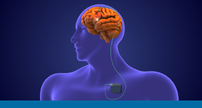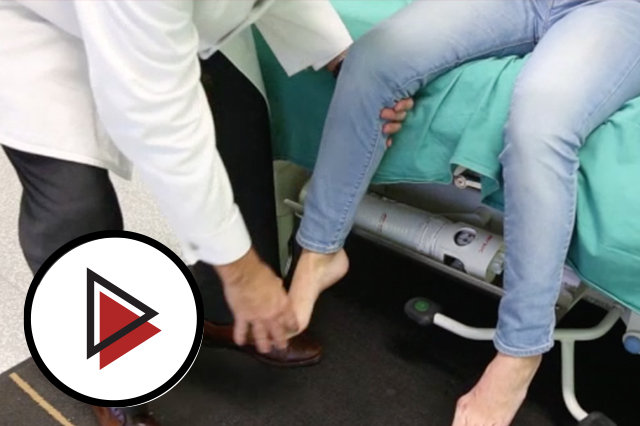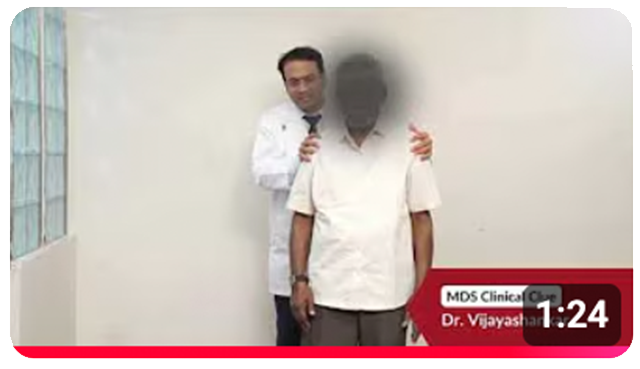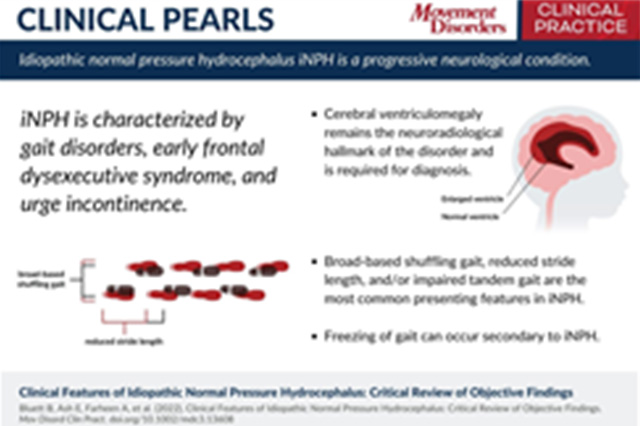
Clinical Resources
Explore the most up-to-date clinical guidelines, tools, courses, and more.
Resources
By Disease
Find clinical resources and information for common movement disorders:
Clinical Tools
Evidence-Based Medicine Reviews
Review the latest recommendations from MDS's Evidence-Based Medicine Reviews, which use a rigorous methodological approach to outline treatment options.
For Underserved Areas & PopulationsResources to help you better understand and address the needs of a variety of underserved patients. |
Education
Courses for Clinicians
Browse live, in-person and on-demand courses tailored to clinicial care.
School for Deep Brain Stimulation and Infusion Therapy in Parkinson’s Disease
In-Person
Bangkok
May 06, 2026 - May 07, 2026
Experienced / Intermediate
1070 <p>The <em>MDS-AOS School for Deep Brain Stimulation and Infusion Therapy in Parkinson’s Disease</em> aims to cultivate the next generation of experts in DBS and infusion therapy for PD, providing them with a comprehensive overview, case-based discussion and hands-on workshop in DBS and infusion therapy in PD. This year's school will start with the basics and then discuss recent updates of DBS and infusion therapy in PD.<br /><br /><span style="color:#990000;"><strong>REGISTRATION DEADLINE: April 22, 2026</strong></span><strong></strong><strong></strong></p> Clinical Trials, Deep brain stimulation, Focused Ultrasound, Gene Therapies, Infusion therapy, Parkinson Disease/Hypokinetic Movement Disorders, Parkinson's Disease (PD), Therapies-Surgical 690 0.00 https://education.movementdisorders.org/Detail/1070/MDS-AOS-School-for-Deep-Brain-Stimulation-and-Infusion-Therapy-in-Parkinson’s-Disease https://education.movementdisorders.org/Upload/ActivityImages/26AOSNMOD_202x108589130.png https://education.movementdisorders.org/Upload/BannerImages/26AOSNMOD_783x404326018.jpg 2026-05-06T00:00:00 2026-05-07T00:00:00 King Chulalongkorn Memorial Hospital, Bangkok <p><br></p><p><br></p> MDS Education <p><a href="https://d1t84l7yt030ad.cloudfront.net/FroalaFiles/26AOSNMOD Course Schedule_no faculty_28012026040724.pdf" rel="noopener noreferrer" target="_blank"><img src="https://s3-us-east-2.amazonaws.com/mds-lms/FroalaFiles/Course schedule_23012024043738.png" style="width: 125px; height: 125px;" class="fr-fic fr-dib"></a><strong>Course Schedule </strong><a href="https://form.jotform.com/260276276503154" rel="noopener noreferrer" target="_blank"><img src="https://s3-us-east-2.amazonaws.com/mds-lms/FroalaFiles/Travel assistance_23012024043912.png" style="width: 125px; height: 125px;" class="fr-fic fr-dib"></a><strong>Travel Bursary </strong><a href="https://d1t84l7yt030ad.cloudfront.net/FroalaFiles/Faculty Listing_LMS_CDs_28012026040755.pdf" rel="noopener noreferrer" target="_blank"><img src="https://s3-us-east-2.amazonaws.com/mds-lms/FroalaFiles/Faculty Details_23012024043924.png" style="width: 125px; height: 125px;" class="fr-fic fr-dib"></a><strong>Course Faculty</strong></p><p><br></p><p><em>Schedule as of January 30, 2026 </em></p><p><strong><em><span style="color: rgb(175, 38, 38);">Travel Bursary Deadline:</span> </em></strong><em>February 20, 2026</em><br><br></p><p><strong>REGISTRATION FEES</strong><br><strong>Members: </strong>$200 USD<br><strong>Junior & No-Fee Members: </strong>$150 USD<br><strong>Non-Members: </strong>$200 USD</p><p>*<em>Non-members wishing to apply for MDS Membership to receive the MDS Member rate for this course will need to apply for membership no later than 2 weeks in advance of the close of registration.</em></p><p><a href="https://s3-us-east-2.amazonaws.com/mds-lms/FroalaFiles/VISA%20STATEMENT%20CANCELLATION%20LANGUAGE_24012024041714.pdf">Click here to view the MDS Regional Course Cancellation Policy & Visa Assistance Information</a></p><p><br></p><p><span style="background-color: null;"><strong>COURSE VENUE</strong></span></p><p>King Chulalongkorn Memorial Hospital</p><p>Bangkok, Thailand<br><br></p><p><strong>SCHEDULE OVERVIEW<em> </em></strong></p><p>Day 1: Wednesday, May 6, 2026 | 8:15 - 17:10<br>Day 2: Thursday, May 7, 2026 | 8:30 - 17:20</p><p><br></p><p><strong>LEARNING OBJECTIVES</strong></p><p>Upon completion of this activity, learners will be able to: </p><p>1. Develop the multi-disciplinary team for deep brain stimulation and infusion therapy</p><p>2. Classify the candidates of deep brain stimulation and infusion therapy</p><p>3. Compare the various targets for deep brain stimulation and choose the best target for subjects</p><p>4. Act initial programming and troubleshooting in patients with deep brain stimulation and those with infusion therapy</p><p>5. Act with deep brain stimulation programmer and infusion pump during hands-on workshops</p><p>6. Establish a local and international network of young clinicians and researchers, fostering collaborations and facilitating future research in the field of deep brain stimulation</p><p><br></p><p><strong>INTENDED AUDIENCE</strong></p><p>The target audience is clinicians, movement disorder specialists, fellows, neurology residents, clinical researchers, and clinical nurse specialists.<br><br></p> Bangkok 0 /Courses/School-for-Deep-Brain-Stimulation-and-Infusion-Therapy-in-Parkinsons-Disease.htm School for Deep Brain Stimulation and Infusion Therapy in Parkinson’s Disease 2026-01-29T12:01:06.523 0 0 Experienced / Intermediate In-Person Parkinson Disease/Hypokinetic Movement Disorders Therapies-Surgical
Clinical Approach to Movement Disorders: Case-Based Video Rounds
Live Online
Feb 24, 2026 - Mar 24, 2026
Foundational / Beginner
1067 The <em>MDS-ES Clinical Approach to Movement Disorders: Case-Based Video Rounds</em> is case-based course (3 sessions, 1.5-hour each) designed as an interactive video-round format focusing on the clinical evaluation of movement disorders. Each session's discussion will be moderated by MDS experts along with experts from the MDS Affiliate societies, who will guide the analysis, highlight key clinical features, and place the cases into a practical diagnostic and management framework. A total of three cases will be presented per session with cases selected through an open call for video submissions from clinicians across Europe, ensuring a broad representation of phenotypes and clinical challenges. Biomarkers, Biomarkers & Diagnostic Tools, Chorea/Huntingtons Disease (HD), Corticobasal Syndrome (CBS)/Corticobasal Degeneration (CBD), Dystonia, Freezing of Gait (FOG), Genetics, Hyperkinetic Movement Disorders, Lewy-body dementia (LBD), Multiple Systems Atrophy (MSA), Myoclonus, Neuroimaging, Neuropathology, Parkinson Disease/Hypokinetic Movement Disorders, Parkinson's Disease (PD), Progressive Supranuclear Palsy (PSP), Rating Scales, Tics/Tourettes syndrome (TS), Tremor/Essential Tremor (ET) 90 0.00 https://education.movementdisorders.org/Detail/1067/MDS-ES-Clinical-Approach-to-Movement-Disorders:-Case-Based-Video-Rounds https://education.movementdisorders.org/Upload/ActivityImages/26ESSERIE_202x108154226.png https://education.movementdisorders.org/Upload/BannerImages/26ESSERIE_734x404168944.jpeg 2026-02-24T00:00:00 2026-03-24T00:00:00 MDS Education <p><a href="https://d1t84l7yt030ad.cloudfront.net/FroalaFiles/26ESSERIES Series Schedule_12012026034216.pdf" rel="noopener noreferrer" target="_blank"><img src="https://s3-us-east-2.amazonaws.com/mds-lms/FroalaFiles/1733945513728_11122024013152.png" class="fr-fic fr-dii" style="width: 125px; height: 125px;"></a><strong>Course Schedule </strong><strong> </strong> <a href="https://d1t84l7yt030ad.cloudfront.net/FroalaFiles/Faculty Listing_LMS_CDs_16012026093007.pdf" rel="noopener noreferrer" target="_blank"><img src="https://s3-us-east-2.amazonaws.com/mds-lms/FroalaFiles/1733945513883_11122024013153.png" class="fr-fic fr-dii" style="width: 125px; height: 125px;"></a><strong>Course Faculty</strong><strong> </strong></p><p><span style="color: rgb(184, 49, 47);"><br></span></p><p><strong>REGISTRATION FEES</strong><br><strong>Members & Non-Members: </strong>$0 USD</p><p><br></p><p><strong>COURSE SCHEDULE</strong><strong><em> </em></strong></p><p>Tuesday, February 24, 2026 | 17:00 - 18:30 CET</p><p>Tuesday, March 10, 2026 | 17:00 - 18:30 CET</p><p>Tuesday, March 24, 2026 | 17:00 - 18:30 CET</p><p><br></p><p><strong>LEARNING OBJECTIVES</strong></p><p>Upon completion of this activity, learners will be able to: </p><p>1. Identify and describe the key phenomenological features of common and selected uncommon movement disorders using video-based clinical observation</p><p>2. Compare and associate observed movement disorder features with the most relevant differential diagnoses in a structured clinical framework</p><p>3. Demonstrate a stepwise, practical approach to evaluating video cases of movement disorders prior to advanced diagnostic testing</p><p>4. Plan an initial diagnostic and referral strategy for patients with suspected movement disorders based on clinical findings and recognized red flags</p><p><br></p><p><strong>INTENDED AUDIENCE</strong></p><p>The target audience is young neurologists or neurologists interested in movement disorders, from all European countries, as well as members of affiliated movement disorder societies.<br><br><br></p> <p><strong>OPEN CALL FOR VIDEO CASE SUBMISSIONS</strong><br>Cases will be selected through an open call for video submissions from clinicians across Europe, ensuring a broad representation of phenotypes and clinical challenges. Registered participants are invited to submit a video case for consideration to be presented at one of the three series sessions. Up to three (3) video cases will be selected per session.<br><br><strong><span style="color: rgb(184, 49, 47);">Video Case Submission Deadline for S</span></strong><span style="color: rgb(184, 49, 47);"><strong>ession 1:</strong></span><strong><span style="color: rgb(184, 49, 47);"> February 1, 2026</span></strong><br><br><span style="color: rgb(0, 0, 0);">Submissions will be reviewed on a rolling basis, with notifications sent to those selected 7-10 days before the session.</span><br><br><span style="color: rgb(0, 0, 0);"><strong>Video Case Submission Deadline for Session 2: </strong>February 15, 2026</span><br><span style="color: rgb(0, 0, 0);"><strong>Video Case Submission Deadline for Session 3:</strong> March 1, 2026</span><br><br><strong>GUIDELINES</strong><br>Video cases should be submitted via the Submission Form linked in the Registration Confirmation Email. All video case submissions should follow the guidelines outlined and use the template provided.<br><br><span style="color: rgb(0, 0, 0);"><strong>DISCUSSION FORMAT</strong><br>The discussion will be moderated by three MDS experts along with the invited experts from the three MDS Affiliate societies, who will guide the analysis, highlight key clinical features, and place the cases into a practical diagnostic and management framework. The course emphasizes bedside observation, phenomenology, and clinical reasoning rather than advanced investigations.</span><br><br><br></p> 0 /Courses/Clinical-Approach-to-Movement-Disorders-Case-Based-Video-Rounds.htm Clinical Approach to Movement Disorders: Case-Based Video Rounds 2026-01-13T12:01:07.073 0 0 Foundational / Beginner Live Online Biomarkers & Diagnostic Tools Hyperkinetic Movement Disorders Parkinson Disease/Hypokinetic Movement Disorders
A Comprehensive Review of Movement Disorders for the Clinical Practitioner
In-Person
Aspen
Jul 26, 2026 - Jul 30, 2026
Foundational / Beginner
1063 <p>The Aspen Course is a unique opportunity for those early career movement disorders specialists, in particular Movement Disorders Fellows, to advance their knowledge and evaluate their careers through advice from advanced professionals in the field. The course program will discuss the classification of these disorders, their differential diagnosis, and their treatment, covering the phenomenology, pathophysiology, pathogenesis, epidemiology, genetics, and other aspects of the entire field of Movement Disorders. </p><p><em><strong>Space is limited; register early to avoid being placed on the waitlist.</strong></em><br /><br /><strong>REGISTRATION DEADLINE:<em> </em></strong>July 10, 2026</p><p><br /></p> Ataxias, Botulinum toxin, Chorea/Huntingtons Disease (HD), Clinical Trials, Corticobasal Syndrome (CBS)/Corticobasal Degeneration (CBD), Deep brain stimulation, Dopaminergic medications, Drug-induced Movement Disorders/Tardive dyskinesia, Dystonia, Freezing of Gait (FOG), Hyperkinetic Movement Disorders, Infusion therapy, Lewy-body dementia (LBD), Medications for motor complications, Medications for motor symptoms, Medications for non-motor symptoms, Multiple Systems Atrophy (MSA), Myoclonus, Other Movement Disorders, Parkinson Disease/Hypokinetic Movement Disorders, Parkinson's Disease (PD), Progressive Supranuclear Palsy (PSP), Therapies-Pharmacological, Therapies-Surgical, Tics/Tourettes syndrome (TS), Tremor/Essential Tremor (ET) 1305 18.75 https://education.movementdisorders.org/Detail/1063/A-Comprehensive-Review-of-Movement-Disorders-for-the-Clinical-Practitioner https://education.movementdisorders.org/Upload/ActivityImages/24ASPEN_202x108254747.png https://education.movementdisorders.org/Upload/BannerImages/26ASPEN_734x404662831.jpg 2026-07-26T00:00:00 2026-07-30T00:00:00 Aspen, Colorado <p><br></p><p><br></p> MDS Education <p><a href="https://d1t84l7yt030ad.cloudfront.net/FroalaFiles/26ASPEN%20Course%20Schedule_17122025081005.pdf" rel="noopener noreferrer" target="_blank"><img src="https://s3-us-east-2.amazonaws.com/mds-lms/FroalaFiles/Course schedule_23012024043738.png" style="width: 125px; height: 125px;" class="fr-fic fr-dib"></a><strong>Course Schedule</strong><strong> </strong><strong> </strong><a href="https://d1t84l7yt030ad.cloudfront.net/FroalaFiles/26ASPEN%20Faculty%20Listing_17122025081542.pdf" rel="noopener noreferrer" target="_blank"><img src="https://s3-us-east-2.amazonaws.com/mds-lms/FroalaFiles/Faculty Details_23012024043924.png" style="width: 125px; height: 125px;" class="fr-fic fr-dib"></a><strong>Course Faculty</strong></p><p><br></p><p><em>Schedule as of December 16, 2025</em></p><p><br></p><p><strong>REGISTRATION FEES</strong><br><strong>Members:</strong> $715 USD<br><strong>Members</strong><strong>: Junior / HP / Basic Science / No Fee:</strong> $450 USD<br><strong>Non-Members*:</strong> $1250 USD</p><p>*<em>Non-members wishing to apply for MDS Membership to receive the MDS Member rate for this course will need to apply for membership no later than 2 weeks in advance of the close of registration.</em></p><p><a href="https://s3-us-east-2.amazonaws.com/mds-lms/FroalaFiles/VISA%20STATEMENT%20CANCELLATION%20LANGUAGE_24012024041714.pdf">Click here to view the MDS Regional Course Cancellation Policy & Visa Assistance Information</a></p><p><br></p><p><span style="background-color: null;"><strong>COURSE VENUE</strong></span></p><p>St. Regis Aspen Hotel</p><p>315 Dean Street</p><p>Aspen, CO, USA</p><p><br></p><p><strong>LEARNING OBJECTIVES</strong></p><p>Upon completion of this activity, learners will be able to: </p><p>1. Recognize and classify parkinsonism, tremor, and other movement disorders</p><p>2. Differentiate atypical parkinsonism from Parkinson’s disease</p><p>3. Appraise treatment approaches for parkinsonism, dystonia, tremor, chorea, and other movement disorders</p><p>4. Evaluate the phenomenology and classification of functional (psychogenic) disorders</p><p>5. Formulate and classify gait disorders in parkinsonism, ataxia, and other hypokinetic or hyperkinetic movement disorders</p><p><br></p><p><strong>INTENDED AUDIENCE</strong></p><p>This activity is intended for clinicians, researchers, post-doctoral fellows, medical residents, medical students, allied health professionals with an interest in current clinical trends and approaches for diagnosis and treatment of movement disorders.</p><p><br></p><p style="text-align: center;"><strong><span style="color:#cc0000;">The tradition of the Aspen Course</span></strong><br><span style="color:#cc0000;"><strong><em>"As a rite of passage every movement disorder fellow must pass through the Aspen course."</em></strong></span><br><span style="color:#cc0000;"><strong> </strong></span><br><span style="color:#cc0000;"><strong>The legend of the Aspen course </strong></span><br><strong><em><span style="color:#cc0000;">"Anyone serious about movement disorders has taken the Aspen course at least once."</span></em></strong></p> <p>This program will take place live and in-person on July 26 – 30, 2026 at the St. Regis Hotel in Aspen, CO, USA.</p><p><br></p><p><strong>The St. Regis Aspen Resort</strong></p><p>315 E. Dean Street</p><p>Aspen, CO, USA</p><p>81611</p><p><br></p><p><strong>ACCOMODATION RESERVATIONS</strong></p><p>MDS has reserved a block of rooms at the <strong>St. Regis</strong> at a discounted rate for <strong>July 26 – 29, 2026</strong>.</p><p><strong>Deadline to book: Wednesday, June 26, 2026.</strong></p><p><br></p><p>To Reserve:</p><p><strong>Phone: </strong>1<strong> </strong>(888) - 627-7198</p><p><br></p><p>Ask for the room block under "A Comprehensive Review of Movement Disorders for the Clinical Practitioner."</p><p><strong>Online: </strong><a href="https://www.marriott.com/event-reservations/reservation-link.mi?id=1754605739063&key=GRP&app=resvlink">https://www.marriott.com/event-reservations/reservation-link.mi?id=1754605739063&key=GRP&app=resvlink</a></p><p><br></p><p>If your stay is outside the dates, please call the number above to book.</p><p><br></p><p><strong>CANCELLATION POLICY</strong><br>All reservations require full prepayment of room and tax, or a major credit card guarantee. Cards will be charged <strong>30 days prior to arrival.</strong><br>Cancellations <strong>more than 30 days</strong> before arrival incur <strong>no penalty</strong>.<br>Cancellations <strong>within 30 days</strong>, early departures, and no-shows <strong>forfeit all deposits</strong><em>.</em></p> Aspen 0 /Courses/A-Comprehensive-Review-of-Movement-Disorders-for-the-Clinical-Practitioner3.htm A Comprehensive Review of Movement Disorders for the Clinical Practitioner Aspen Course 2026-01-09T18:01:01.590 0 0 Foundational / Beginner In-Person Hyperkinetic Movement Disorders Other Movement Disorders Parkinson Disease/Hypokinetic Movement Disorders Therapies-Pharmacological Therapies-Surgical
MDS African Parkinson’s Disease and Movement Disorders Conference (APMC)
In-Person
Nairobi
Mar 10, 2026 - Mar 11, 2026
Experienced / Intermediate, Expert / Advanced
1065 <p>The MDS African Parkinson’s Disease and Movement Disorders Conference (APMC) brings together clinicians, researchers and experienced allied health professionals for practical, skills-based education in Movement Disorders across Africa. The program features interactive workshops on clinical evaluation and genetic testing, expert-led sessions on Parkinson’s disease in a regional setting, acquired Movement Disorders, multidisciplinary care, and emerging topics, as well as a panel highlighting successful African collaborations and combating stigma in Parkinson’s disease and movement disorders.</p><p><span style="font-size:11.0pt;"> </span></p> Ataxias, Biomarkers, Biomarkers & Diagnostic Tools, Botulinum toxin, Chorea/Huntingtons Disease (HD), Dopaminergic medications, Drug-induced Movement Disorders/Tardive dyskinesia, Dystonia, Epidemiology, Epidemiology & Environment, Functional Movement Disorders, Genetic & Hereditary Disorders, Genetics, Hyperkinetic Movement Disorders, Infusion therapy, Movement Disorders Emergencies, Myoclonus, Neuroimaging, Occupational Therapy, Other Movement Disorders, Parkinson Disease/Hypokinetic Movement Disorders, Parkinson's Disease (PD), Physical Therapy/Physiotherapy, Rare/Uncommon Movement Disorders, Risk Factors, Speech Therapy, Therapies-Other, Therapies-Pharmacological, Tics/Tourettes syndrome (TS), Toxic Exposures, Tremor/Essential Tremor (ET) 1170 0.00 https://education.movementdisorders.org/Detail/1065/MDS-African-Parkinson’s-Disease-and-Movement-Disorders-Conference-(APMC) https://education.movementdisorders.org/Upload/ActivityImages/26AFRGP2_202x108872238.png 2026-03-10T00:00:00 2026-03-11T00:00:00 Nairobi <p><br></p><p><img src="https://s3-us-east-2.amazonaws.com/mds-lms/FroalaFiles/GP2_21032024044229.jpg" style="width: 300px;" class="fr-fic fr-dib"></p><p><br></p><p><em>Supported in part by the Global Parkinson’s Genetics Program, a program of the Aligning Science Across Parkinson’s initiative and implemented by the Michael J. Fox Foundation</em> </p> MDS Education <p><strong><img src="https://d1t84l7yt030ad.cloudfront.net/FroalaFiles/Course schedule_13052025105320.png" style="width: 125px; height: 125px;" class="fr-fic fr-dib"></strong><a href="https://execinccom-my.sharepoint.com/:b:/g/personal/treed_execinc_com/IQCv1vnTd_Q2RJMmoTxixxCvAVuVg4tOWUFca0MOoKqFhPE?e=U0anKF" rel="noopener noreferrer" target="_blank"><strong> Conference Schedule </strong> </a><a href="https://form.jotform.com/260055452458154" rel="noopener noreferrer" target="_blank"><img src="https://s3-us-east-2.amazonaws.com/mds-lms/FroalaFiles/Travel assistance_23012024043912.png" style="width: 125px; height: 125px;" class="fr-fic fr-dib"></a><a href="https://form.jotform.com/260055452458154" rel="noopener noreferrer" target="_blank"><strong>Travel Bursary </strong></a><strong> </strong><img src="https://s3-us-east-2.amazonaws.com/mds-lms/FroalaFiles/Faculty Details_23012024043924.png" style="width: 125px; height: 125px;" class="fr-fic fr-dib"><a href="https://execinccom-my.sharepoint.com/:b:/g/personal/treed_execinc_com/IQBWWB0q4LFzQaaP6HFHAHV3AdEDj515nDsPK6mk25mCD5k?e=i6zCCG" rel="noopener noreferrer" target="_blank"><strong>Conference</strong><strong> Faculty</strong></a></p><p><br></p><p><em>Program </em>S<em>chedule will be shared in the coming week</em></p><p><strong><em><span style="color: rgb(175, 38, 38);">Application/Travel Bursary Deadline:</span> </em></strong><em>January 22</em><em>, 2026</em></p><p><em>*Limited Spaces Available*</em></p><p><br></p><p><strong>REGISTRATION FEES</strong><br>Complimentary registration provided to those accepted.</p><p><a href="https://s3-us-east-2.amazonaws.com/mds-lms/FroalaFiles/VISA%20STATEMENT%20CANCELLATION%20LANGUAGE_24012024041714.pdf"><em>Click here to view the MDS Regional Course Cancellation Policy & Visa Assistance Information</em></a></p><p><br></p><p><strong>SCIENTIFIC PLANNING COMMITTEE</strong></p><p>Ali Shalash, MD, PhD </p><p>Nijedka Okubadejo, MD, FMCP, FAAN, FANA</p><p>Oluwadamilola Ojo, MBBS, MD, FMCP</p><p>Samia ben Sassi, MD</p><p>Maouly Fall, MD</p><p>Yared Zewde, MD</p><p>Daniel Gams Massi, MD</p><p>Jonathan Carr, MBChB, PhD</p><p>Mary Agoriwo, MSc, PhD (C)</p><p>Houyam Tibar, Associate Professor</p><p>Juzar Hooker, MB ChB MMed DCN FCP </p><p>Dilraj S. Sokhi, FRCP(Edin)</p><p><br></p><p><strong>LEARNING OBJECTIVES</strong></p><p>Upon completion of this activity, learners will be able to: </p><ol><li data-end="386" data-start="223"><p data-end="386" data-start="226">Apply a structured clinical approach to evaluating Movement Disorders, including the differentiation of parkinsonism, hyperkinetic disorders, and ataxias.</p></li><li data-end="536" data-start="388"><p data-end="536" data-start="391">Identify appropriate indications and strategies for genetic testing in Movement Disorders, including recognition of key clinical red flags.</p></li><li data-end="735" data-start="538"><p data-end="735" data-start="541">Describe the genetic, environmental, and clinical factors influencing Parkinson’s disease in Africa, and discuss practical strategies for diagnosis and management in low-resource settings.</p></li><li data-end="878" data-start="737"><p data-end="878" data-start="740">Recognize and manage major categories of acquired Movement Disorders, including infectious, autoimmune, and drug-induced conditions.</p></li><li data-end="1060" data-start="880"><p data-end="1060" data-start="883">Implement multidisciplinary, patient-centered approaches to Movement Disorders care, including the management of emergencies, functional disorders, and rehabilitation needs.</p></li></ol><p><br></p><p><strong>INTENDED AUDIENCE</strong></p><p>The MDS African Parkinson’s Disease and Movement Disorders Conference (APMC) is designed for experienced and expert clinicians, researchers, allied health professionals, and trainees involved in Movement Disorders care across Africa who seek to strengthen their clinical knowledge, practical skills, and understanding of regional diagnostic and multidisciplinary care approaches.</p> Nairobi 0 /Courses/MDS-African-Parkinsons-Disease-and-Movement-Disorders-Conference-APMC.htm MDS African Parkinson’s Disease and Movement Disorders Conference (APMC) 2026-01-07T12:01:03.130 0 0 Experienced / Intermediate Expert / Advanced In-Person Biomarkers & Diagnostic Tools Epidemiology & Environment Hyperkinetic Movement Disorders Other Movement Disorders Parkinson Disease/Hypokinetic Movement Disorders Therapies-Other Therapies-Pharmacological
Other Educational Resources
Get More Clinical Support
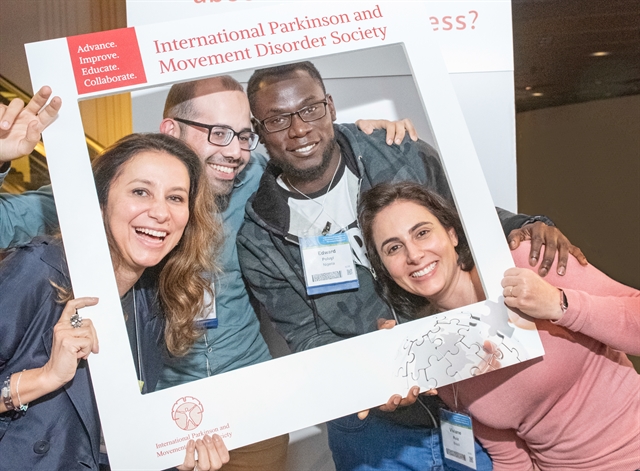
Join MDS
Members gain access to case videos, peer-to-peer collaboration opportunities, discounted education, and a variety of specialized programs.

Attend the International Congress
Discover the latest in the field, and connect with leaders from around the globe.











